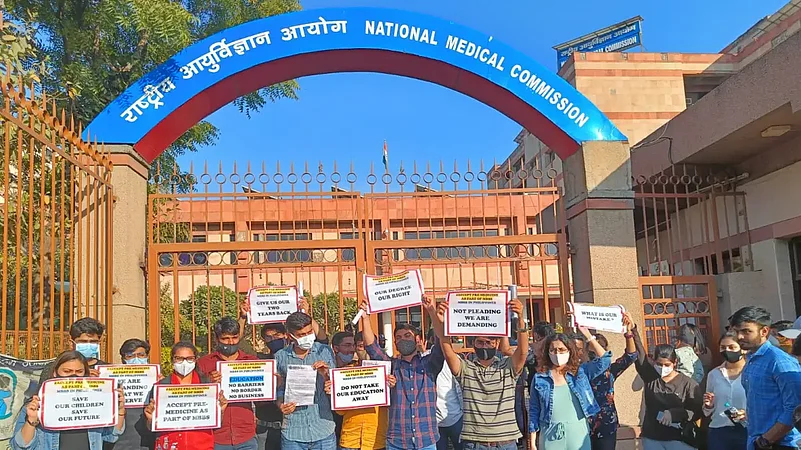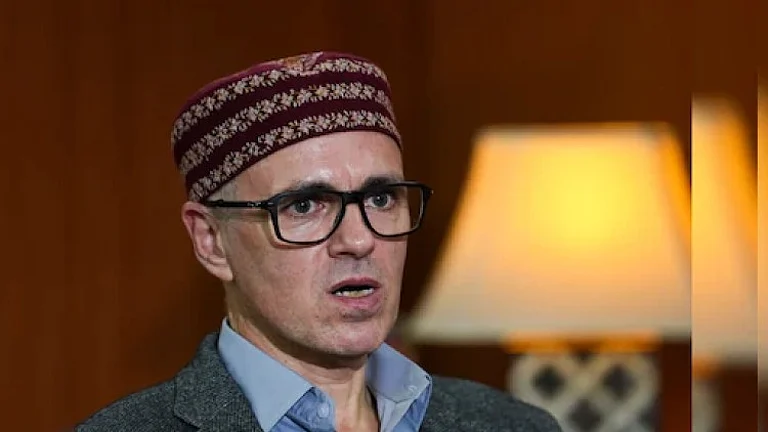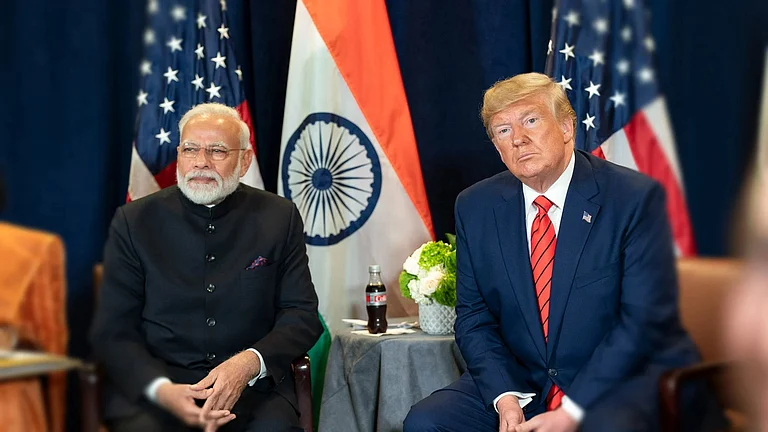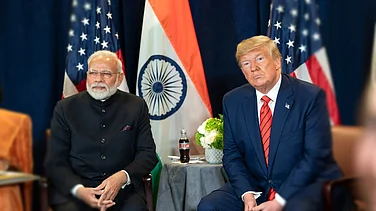For the over 9.93 lakh students who recently cleared the National Eligibility Cum Entrance Test (NEET) this year, the struggle has just begun. To begin with, the ensuing tussle to get admission in medical, dental, nursing and traditional medicine colleges in the country is going to be ruthless. The ambiguity-laced new regulation of the National Medical Commission (NMC), the apex regulatory body for medical professionals in India, with respect to foreign medical aspirants is not going to help either. Making matters worse is the silence of the NMC in the face of scores of desperate medical students seeking clarity about their futures.
Out of all the courses, Bachelor of Medicine, Bachelor of Surgery (MBBS) is the most sought-after undergraduate medical course but it can absorb only 10 per cent of the total NEET-qualified candidates. The ones who fail to get admission either wait and take the test next year again to improve their score or look for options abroad—the latter being the more popular option.
This option, however, seems to be getting more complicated for them and also for the ones studying abroad currently with confusion shrouding NMC’s new regulations—the National Medical Commission (Foreign Medical Graduate Licentiate) Regulations, 2021.
Against this background, a lot of agents, in collusion with foreign universities, are making the most of the current scenario by spreading misleading information to attract students abroad as they earn a huge commission on every admission, leaving the students vulnerable.
Why Norms Need Clarification
A section of education counsellors, students and their parents say that since the new regulation was enacted in November last year, there has been utter chaos.
Every year, about 10,000 to 15,000 students go to countries like China, Russia, the Philippines, Kyrgyzstan, Kazakhstan, Georgia, Nepal and Bangladesh, among others, to study undergraduate medical courses as the fee is lower in these countries as compared to private colleges in India. Despite so many candidates being eligible for admission, prohibitive costs and limited availability of seats make them venture abroad. The NMC regulation has cast a shadow of doubt over the futures of such students.
The new regulation lists a few conditions that foreign graduates need to cover in order to appear for the National Exit Test (NExT)—a test that will be made mandatory for medical students to obtain a practicing licence in India. The NMC has said that it would start conducting it from 2023.
As per one of the conditions, Regulation 4 (b), to take the test, the ones who have a degree from a foreign university have to be “registered with the respective professional regulatory body or otherwise, competent to grant a license to practice medicine in their respective jurisdiction of the country in which the medical degree is awarded and at par with the license to practice medicine given to citizen of that country.”
Legal and medical experts say that the general interpretation of Regulation 4 (b) is that a foreign medical graduate must be registered with the regulatory body of the country from which he graduates. Further, the registration should be on par with the license to practice medicine in that country.
Viraj Kadam, an advocate who deals with cases related to medical education, says that it is not clear what would be the case if a student with a medical degree from a certain country gets registered with the competent authority of that country but does not get the right to practice there. “Can the candidate be eligible to appear in the screening test (NExT) in India?” Kadam asks.
For instance, countries like Bangladesh provide temporary registration to foreign students to do only internships and do not allow them to practice in the country. Malaysia and the Philippines do not allow foreign students to appear in examinations to get a license to practice there.
There is a similar confusion about internships and the language of instruction. According to the new regulation, 54 months is the minimum duration to study MBBS followed by a year of internship at the same college.
“To align with NMC norms, colleges in many countries have restructured their semesters. Those who were offering a six-year MBBS are now calling it a five-year (degree) plus one year of internship. What will be the validity of such restructuring?” asks education counsellor Anuj Goyal, who runs the firm Get My University.
The Deafening Silence
Amidst all this, students complain that the NMC does not respond to their queries.
“We do not get a valid response on calls. When we visit the NMC office, guards do not allow us to enter, so we do not know how to get the right information,” says Ankit Sharma, a student aspiring to study abroad.
Goyal says that when he approached the NMC seeking information under the RTI Act, he was disappointed as the replies were as vague as the regulation itself.
“I asked NMC to provide me information about countries which fulfil the 4 (b) condition. To this, NMC reproduced the same section of the regulation in its reply which does not serve any purpose,” he adds.
Legal and medical experts are of the view that the NMC must put up the names of the countries that fulfil all the criteria of its regulations on its website so that students do not get misled by agents.
Outlook also wrote an email to Dr. Suresh Chandra Sharma, chairman, NMC, seeking information regarding countries that comply with the NMC regulations but did not get a response.
Such confusion did not exist under the Medical Council of India (MCI), the regulator before NMC. Shikhar Ranjan, former legal head of the erstwhile MCI, says, “The earlier legal regime required foreign medical graduates to complete their course abroad and do internship either in that country or in India. After their return to India, they used to qualify for a screening test and were entitled to registration to practice as a doctor.”
Systemic Ambiguity
Indian embassies in foreign countries, which are supposed to be the guardians of students studying abroad, too, add to their woes with contradictory or vague responses. Education counsellors say that writing to Indian embassies or filing applications under the Right to Information (RTI) Act to them is of no help.
For instance, for queries on Regulation 4 (b) mentioned above, the Indian embassy in Belarus provided two contradictory responses.
In one reply, quoting the Belarusian State Medical University, it said that no additional registration is required to practice medicine in Belarus and that a “graduate of the Belarusian State Medical University has all necessary competencies to practice medicine either in India or in other countries.”
However, in response to an application filed by another candidate seeking clarification for the same regulation, it quoted the Ministry of Health of the Republic of Belarus and said that on completion of graduation in Belarus, foreign students have to do a clinical residency for three to five years. To get admitted to the clinical residency, they have to apply to a medical university in Belarus and pass an interview for the evaluation of their Russian language proficiency. It also mentioned how Indian students can get a right to practice in Belarus, a process which includes getting into the clinical residency, clearing a qualification internship examination to get a certificate of internship completion which then grants them the right to practice.
“It is quite interesting to note that NMC says that medical education should be mandatorily in the English language. Then how can an Indian student get proficiency in Russian language and qualify for clinical residency which is a mandatory requirement in Belarus, as per the response of the Indian embassy?” argues Srinivas Babu, an education consultant.
He mentions that when one of his colleagues sought similar information from the Indian Embassy in Kyrgyzstan under the RTI Act, it said, “The applicant is advised to seek the relevant information from the concerned universities/colleges of Kyrgyzstan only.”
A medical expert associated with the government says that such replies from the embassies come handy for agents to misguide students as colleges never provide correct information because it will hamper their business. “On the contrary, they have hired agents in India on hefty commissions to attract students and get them admitted there,” he says, requesting anonymity.
“I have received similar vague responses from embassies in other countries such as Russia, Kazakhstan, Georgia, etc. Only the Indian Embassy in China has uploaded FAQs on its website which clarify everything,” says Goyal.
He says that he is preparing to file a PIL in the Delhi High Court for a direction to the NMC to provide a simple interpretation of various provisions of the regulations.































